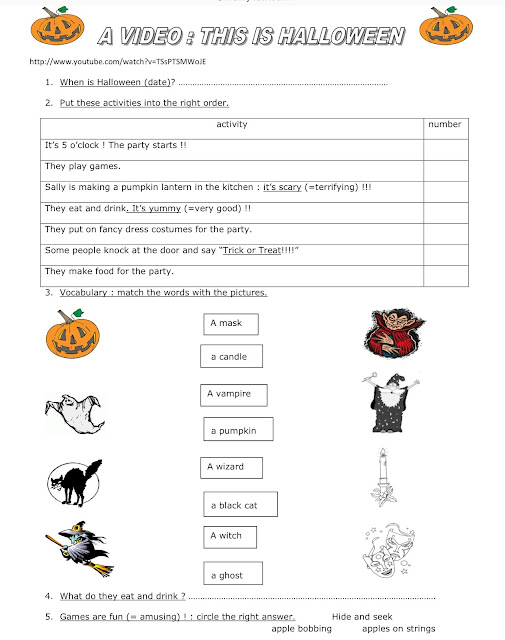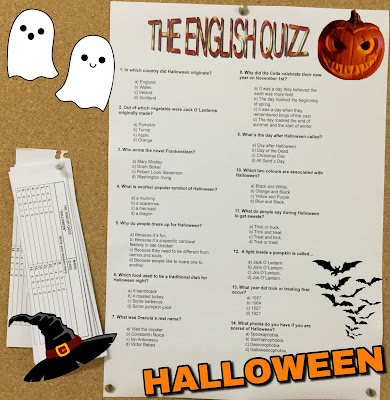domingo, 23 de diciembre de 2018
lunes, 17 de diciembre de 2018
PRESENT PERFECT VS PAST SIMPLE
--> Complete the sentences using the Past Simple or the Present Perfect.
1.- They _________ (write) their exams yesterday.
2.- They _________ (start) building their new house 18 months ago.
3.- I ________ (meet) the company manager two weeks ago.
4.- I ________ (be born) in 1964.
5.- That was the best concert I _____ ever _______ (see).
6.- I __________ (not eat) anything since breakfast.
7.- I _________ (study) English for 10 years.
8.- You ___________ (change) your address recently.
9.- When I was 15 I _________ (go) to Dublin.
10.- My students _________ (raise) a lot of money for charity.
11.- We _________ (not go) to the cinema last night.
12.- My uncle ________ (arrive) in Lisbon last night but he _________ (not call)
13.- We _________ (not see) Pedro Almodovar’s new film yet.
14.- _________ (you go) abroad this year?
15.- The shop is probably closed because they _______ (go) for lunch.
16.- When I ______ (be) at school I ______ (not like) Maths.
17.- What’s the matter with your brother? He ________ (lose) his mobile.
18.- Mark Spitz ________(win) seven Olympic gold medals in 1972.
19.- Why are you crying? Because I _______ (cut) my finger.
20.- When Mary was young she _______ (love) skiing.
--> Translate the following sentences.
1.- La profesora todavía no ha corregido todos los exámenes.
2.- Mi hermano tiene ese coche desde el mes pasado.
3.- Mis padres acaban de comprar unos libros.
4.- ¿Desde cuándo estudias Inglés? Estudio inglés desde hace unos meses.
1.- They _________ (write) their exams yesterday.
2.- They _________ (start) building their new house 18 months ago.
3.- I ________ (meet) the company manager two weeks ago.
4.- I ________ (be born) in 1964.
5.- That was the best concert I _____ ever _______ (see).
6.- I __________ (not eat) anything since breakfast.
7.- I _________ (study) English for 10 years.
8.- You ___________ (change) your address recently.
9.- When I was 15 I _________ (go) to Dublin.
10.- My students _________ (raise) a lot of money for charity.
11.- We _________ (not go) to the cinema last night.
12.- My uncle ________ (arrive) in Lisbon last night but he _________ (not call)
13.- We _________ (not see) Pedro Almodovar’s new film yet.
14.- _________ (you go) abroad this year?
15.- The shop is probably closed because they _______ (go) for lunch.
16.- When I ______ (be) at school I ______ (not like) Maths.
17.- What’s the matter with your brother? He ________ (lose) his mobile.
18.- Mark Spitz ________(win) seven Olympic gold medals in 1972.
19.- Why are you crying? Because I _______ (cut) my finger.
20.- When Mary was young she _______ (love) skiing.
--> Translate the following sentences.
1.- La profesora todavía no ha corregido todos los exámenes.
2.- Mi hermano tiene ese coche desde el mes pasado.
3.- Mis padres acaban de comprar unos libros.
4.- ¿Desde cuándo estudias Inglés? Estudio inglés desde hace unos meses.
Etiquetas:
4 ESO,
grammar,
past simple,
Present perfect
PAST SIMPLE vs PRESENT PERFECT QUESTIONNAIRE
Complete this questionnaire about Past Simple and Present Perfect.
viernes, 14 de diciembre de 2018
PRESENT PERFECT vs PAST SIMPLE
DIFFERENCES BETWEEN PAST SIMPLE AND PRESENT PERFECT
PAST SIMPLE TIME EXPRESSIONS
PRESENT PERFECT TIME EXPRESSIONS
Etiquetas:
4 ESO,
past simple,
Present perfect,
time expressions
jueves, 13 de diciembre de 2018
PRESENT PERFECT + EVER, NEVER, JUST, ALREADY, YET, SINCE, FOR
We often use EVER, NEVER, JUST, ALREADY, YET, SINCE and FOR with the present perfect tense.
We use EVER in interrogative sentences to express " at any time":
Examples:
Have you ever been to the United States?
Have you ever traveled by train?
Have you ever failed a class?
We use NEVER in affirmative sentences (but the meaning is negative) to express "at no time".
Examples:
I have never cheated in an exam.
My son has never been to Moscow.
My brother has never travelled to London.
We use JUST to express a recently completed action.
Examples:
The cat has just caught a bird.
The guests have just arrived.
I have just finished my homework.
We use ALREADY to express that something has happened sooner than expected.
Examples:
Don't forget to bring your book! Oh, I have already brought it.
The boys are going to pack, aren't they? No. They have already packed.
Is Adam going to buy a new car? No, he isn't. He has already bought it.
We use YET in interrogative and negative sentences and it suggests a time later than expected.
Examples:
Have you done your homework? No, I haven't done it yet
Has your father seen your report? No, he hasn't seen it yet
Have the visitors arrived? No, they haven't arrived yet.
We use SINCE to express a point in the time.
Examples:
She has lived here since 1980.
Alice has been married since March 2nd.
They have been at the hotel since last Tuesday.
We use FOR to express a period of time.
Examples:
I have worked here for five years.
We have taught at this school for a long time.
They have been at the hotel for a week
Now do this exercise.
We use EVER in interrogative sentences to express " at any time":
Examples:
Have you ever been to the United States?
Have you ever traveled by train?
Have you ever failed a class?
We use NEVER in affirmative sentences (but the meaning is negative) to express "at no time".
Examples:
I have never cheated in an exam.
My son has never been to Moscow.
My brother has never travelled to London.
We use JUST to express a recently completed action.
Examples:
The cat has just caught a bird.
The guests have just arrived.
I have just finished my homework.
We use ALREADY to express that something has happened sooner than expected.
Examples:
Don't forget to bring your book! Oh, I have already brought it.
The boys are going to pack, aren't they? No. They have already packed.
Is Adam going to buy a new car? No, he isn't. He has already bought it.
We use YET in interrogative and negative sentences and it suggests a time later than expected.
Examples:
Have you done your homework? No, I haven't done it yet
Has your father seen your report? No, he hasn't seen it yet
Have the visitors arrived? No, they haven't arrived yet.
We use SINCE to express a point in the time.
Examples:
She has lived here since 1980.
Alice has been married since March 2nd.
They have been at the hotel since last Tuesday.
We use FOR to express a period of time.
Examples:
I have worked here for five years.
We have taught at this school for a long time.
They have been at the hotel for a week
Now do this exercise.
Complete the sentences with the Present Perfect of the verbs in brackets and with the correct word (ALREADY, EVER, NEVER, JUST, YET, FOR, SINCE).;
1. We can't eat chips again. We _____________ (have) them three times this week.
2. Better: _________________ (you/clean) the bathroom _________?
Billy: Yes, I _____________________ (do) it. I did it two hours ago.
3. _______________________ (your sister/ see) the new film _________?
4. Tim _________________ (be) a teacher _______ 1996.
5. Jim is ok. I _____________ (see) him in the street.
6. Your family _____________ (live) in Bogota _______ ten years.
7. We are going to a concert on Friday but we ______________ (not buy) the tickets ________.
8. They ______________ (fly) in a helicopter. This is the first time.
9. ____________________ (meet) a famous person?
martes, 27 de noviembre de 2018
PRESENT SIMPLE
Click on the red link below to practice the Present Simple.
http://learnenglishteens.britishcouncil.org/grammar/beginner-grammar/present-simple
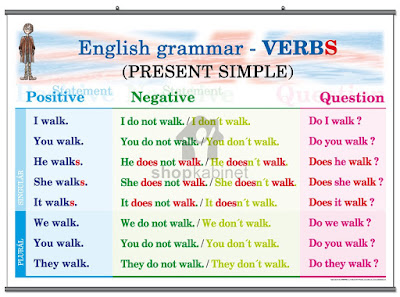
http://learnenglishteens.britishcouncil.org/grammar/beginner-grammar/present-simple

martes, 20 de noviembre de 2018
EJERCICIOS DE REPASO
- ¡¡NO ES NECESARIO COPIAR LAS FRASES!!
- 1. Complete the sentences with the correct form of the verb TO BE. (A = affirmative / N = negative).
- 1. My mother in the kitchen. (A)
- 2. The pupils at school today. (N)
- 3. Maria's grandmother from Brazil. (A)
- 4. I a football fan. (N)
- 5. Your pencil case at home. (A)
- 6. you from Sheffield?
- 2. Complete the sentences using the verb TO BE or HAVE GOT. 1. I .................... tall.
2. I ..................................... blue eyes.
3. She ....................... small.
4. They .............................. long hair.
5. She ..........................a small nose.
6. You ...................... thin.
7. We ........................... fat.
8. You ................................... long fingers.
9. He ....................... fat.
10. He ....................... a big mouth.
- 3. Write the following numbers.
- A) 475
- B) 5897
- C) 13923
- D) 11382
- E) 1st
- F) 3rd
- G) 12th
- H) 25th
- I) 32nd
viernes, 9 de noviembre de 2018
miércoles, 7 de noviembre de 2018
PAST SIMPLE vs PAST CONTINUOUS
Watch this video to understand the difference between the Past Simple and the Past Continuous.
Now, let's do this exercise to practise these two verb tenses.
https://www.perfect-english-grammar.com/past-simple-past-continuous-exercise-1.html

Now, let's do this exercise to practise these two verb tenses.
https://www.perfect-english-grammar.com/past-simple-past-continuous-exercise-1.html

THERE IS/ARE // A / AN / SOME / ANY
1. Fill in the gaps with some / any / a /an
|
1. There aren't _____ children in the playground
2. There are _____ people in that room
3. He isn't wearing _____ uniform
4. Is there _____ fruit left?
5. There is _____ bread left
|
6. Have you got _____ money?
7. They haven't got _____ computer in their room
8. There aren't _____ books in my rucksack (mochila)
9. Is there _____ good cinema in your town
10. There aren't _____ parks near my house
|
2. Fill in the gaps with some, any, a or an
1. There are .......... potatoes on the table
a) some b) any
c) a d) an
2. Are there ....... books on your desk?
a) some b)
any c) a d) an
3. Is there ........ coffee left?
a) some b)
any c) a d) an
4. Have you got ....... brothers or sisters?
a) some b)
any c) a d) an
5. He hasn't got ........ money
a) some b)
any c) a d) an
6. He never wears .......... uniform
a) some b)
any c) a d) an
7. There aren't ........ tickets for the concert
left
a) some b)
any c) a d) an
8. There are ......... apples in the basket (cesta)
a) some b)
any c) a d) an
9. She isn't wearing ........ dress
a) some b)
any c) a d) an
10. Is there ........ sugar in your tea?
a) some b) any
c) a d) an
11. He hasn't got ........ girlfriend
a) some b)
any c) a d) an
|
1. __________ any sugar in the cupboard
2. ____________ any people?
3. ____________ some coffee
4. ____________ any stamps left
5. ____________ any money in my pocket
|
6. ____________ any fruit?
7. ____________ any tickets?
8. ____________ any tea in my cup
|
9. ____________ any petrol ?
10. ____________ any books
11. ____________ some children
|
miércoles, 31 de octubre de 2018
THE TELL TALE HEART (HALLOWEEN)
Here you have the scary film "The Tell Tale Heart", adapted from Edgar Allan Poe's short story of the same title. Let's watch it and do some activities about it.
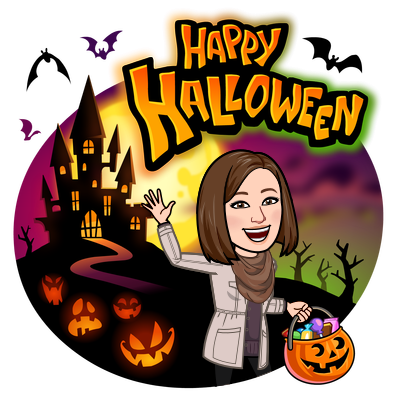
ACTIVITIES:
- What do you expect to find in a horror story?
- Watch the adaptation from Poe's tale and order the sentences as they appear in the film.
_____ True, I'm nervous , very very dreadfully nervous, but why would you say that I am mad?
_____ Yes, yes, I did it.
_____ He had never harmed me.
_____ A scream, my own gentlemen, a childish dream. But, come in, please.
_____ I think, I think it was his eye.
_____ Nothing out of place here.
_____ For an hour I didn't move a muscle.
_____ Of course I had to get rid of the eye.
_____ But there were still work to be done.
_____ Still I waited while time slowed, stopped, end out.
- Write a sentence with each word relating it to the story.
Example: old man The narrator lived with an old man.
gold eye seven days
the beating of the heart a scream the police
floor jail mad
- Write a short horror story (about 100 words).
martes, 30 de octubre de 2018
viernes, 26 de octubre de 2018
jueves, 25 de octubre de 2018
VERB TO BE

This is the verb TO BE! It's very easy and veeeeryyy important. Have a look at it and then do some practice. Good luck!
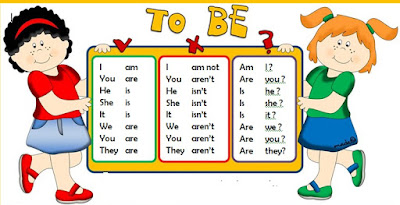
https://www.englisch-hilfen.de/en/exercises/tenses/be2.htm
https://www.englisch-hilfen.de/en/exercises/tenses/be3.htm
viernes, 19 de octubre de 2018
USED TO EXERCISES
Practice the USE TO structure in the following link.
https://elt.oup.com/student/solutions/int/grammar/grammar_02_022e?cc=global&selLanguage=en
https://www.perfect-english-grammar.com/used-to-exercise-1.html
https://elt.oup.com/student/solutions/int/grammar/grammar_02_022e?cc=global&selLanguage=en
https://www.perfect-english-grammar.com/used-to-exercise-1.html
miércoles, 17 de octubre de 2018
martes, 16 de octubre de 2018
miércoles, 10 de octubre de 2018
SUBJECT and OBJECT PRONOUNS
Here you have some links to practise the use of SUBJECT and OBJECT PRONOUNS.
PAST SIMPLE / USED TO
Complete these sentences using the PAST SIMPLE or the USED TO structure.
- 1.
- 2.I ____________ (smoke) when I was a child.
- 3.______________ (you) drink wine when you were young?
- 4.I ________________ (play) with dolls when I was a child
- 5.I ______________ (eat) tacos this afternoon.
- 6.
- 7.Ana Guevara __________ (run) in Europe four years ago.
- 8.I __________ (do) my homework yesterday.
- 9.Peter ______________ (drink) chocomilk, but now he drinks micheladas.
- 10.He _________________ (study) piano lessons, but now he plays soccer.
- Click on this link for more practice.
miércoles, 3 de octubre de 2018
viernes, 28 de septiembre de 2018
POSSESSIVE ‘S (SAXON GENITIVE)
Rewrite these sentences using the possessive ‘s structure.
1. The bikes of the women.
2. The food of the hamster.
3. The car of the family.
4. The idea of his grandparents.
5. The letter of Ben.
6. The number of winners.
7. The umbrella of Carmen.
8. The wedding of my friends.
9. The bedroom of Cristina.
10. The house of my aunt.
1. The bikes of the women.
2. The food of the hamster.
3. The car of the family.
4. The idea of his grandparents.
5. The letter of Ben.
6. The number of winners.
7. The umbrella of Carmen.
8. The wedding of my friends.
9. The bedroom of Cristina.
10. The house of my aunt.
Suscribirse a:
Comentarios (Atom)







